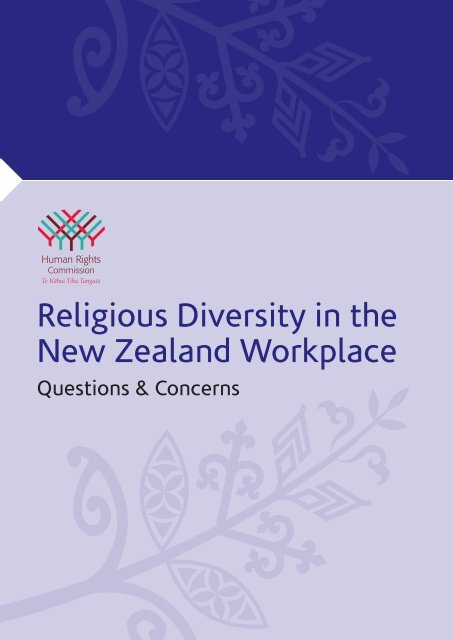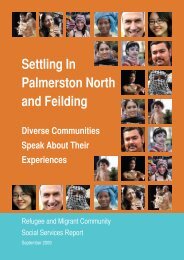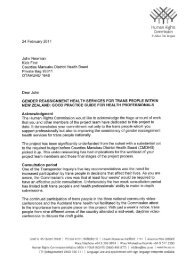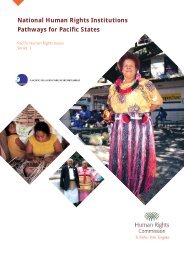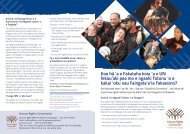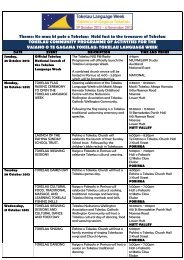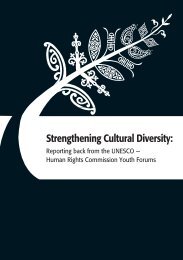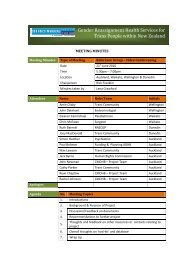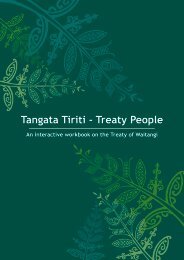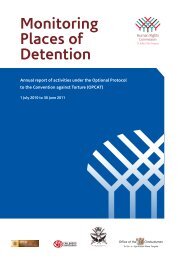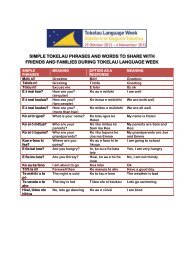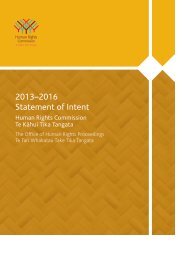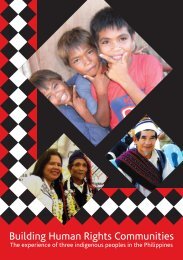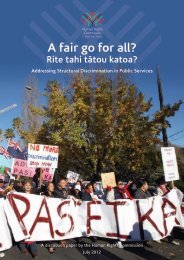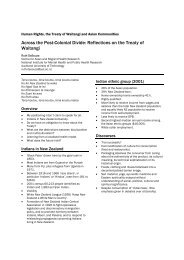Religion in the workplace - Human Rights Commission
Religion in the workplace - Human Rights Commission
Religion in the workplace - Human Rights Commission
You also want an ePaper? Increase the reach of your titles
YUMPU automatically turns print PDFs into web optimized ePapers that Google loves.
Religious Diversity <strong>in</strong> <strong>the</strong><br />
New Zealand Workplace<br />
Questions & Concerns
Contact <strong>the</strong> <strong>Commission</strong><br />
<strong>Human</strong> <strong>Rights</strong> <strong>Commission</strong> InfoL<strong>in</strong>e<br />
0800 496 877 (toll free)<br />
Fax 09 377 3593 (attn: InfoL<strong>in</strong>e)<br />
Email <strong>in</strong>fol<strong>in</strong>e@hrc.co.nz<br />
TXT 0210 236 4253<br />
www.hrc.co.nz<br />
Language L<strong>in</strong>e and NZ Sign Language <strong>in</strong>terpreter available<br />
If you have a hear<strong>in</strong>g or speech impairment, you can contact <strong>the</strong> <strong>Commission</strong> us<strong>in</strong>g <strong>the</strong> New<br />
Zealand Relay Service. NZ Relay is a telecommunications service and all calls are confidential.<br />
www.nzrelay.co.nz<br />
Tämaki Makaurau – Auckland<br />
Level 3, 21 Queen Street<br />
PO Box 6751, Wellesley Street<br />
Tämaki Makaurau Auckland 1141<br />
Waea Telephone 09 309 0874<br />
Waea Whakähua Fax 09 377 3593<br />
Te Whanganui ä Tara – Well<strong>in</strong>gton<br />
Level 1 Vector Build<strong>in</strong>g, 44-52 The Terrace<br />
PO Box 12411, Thorndon<br />
Te Whanganui ä Tara Well<strong>in</strong>gton 6144<br />
Waea Telephone 04 473 9981<br />
Waea Whakähua Fax 04 471 6759<br />
Ötautahi – Christchurch<br />
Level 2 Moeraki Suite, Plan B Build<strong>in</strong>g<br />
9 Baigent Way, Middleton<br />
PO Box 1578, Ötautahi Christchurch 8140<br />
Waea Telephone 03 379 2015<br />
Waea Whakähua Fax 03 353 0959<br />
Text by Paul Morris, Professor of Religious Studies, Victoria University of Well<strong>in</strong>gton<br />
ISBN: 978-0-478-35618-2<br />
Published December 2011<br />
Auckland, Aotearoa New Zealand<br />
This work is licensed under <strong>the</strong> Creative Commons Attribution 3.0 New Zealand License. To<br />
view a copy of this license, visit http://creativecommons.org/licenses/by/3.0/nz/.
Contents<br />
Introduction 3<br />
Purpose 3<br />
Context 3<br />
Process 4<br />
High days and holidays 5<br />
Compassionate bereavement leave 5<br />
Prayer times and facilities 6<br />
Dress codes and appearance 6<br />
Public religious displays at work 6<br />
Religiously problematic or forbidden activities 7<br />
The promotion of religion <strong>in</strong> <strong>the</strong> <strong>workplace</strong> 7<br />
Compla<strong>in</strong>ts, concerns and issues 8<br />
Religious diversity <strong>in</strong> <strong>the</strong> New Zealand <strong>workplace</strong> – Employer’s checklist 9<br />
Religious diversity <strong>in</strong> <strong>the</strong> New Zealand <strong>workplace</strong> – Employee’s checklist 10<br />
Statement on Religious Diversity 11
3 Religious Diversity <strong>in</strong> <strong>the</strong> New Zealand Workplace<br />
Introduction<br />
The last twenty five years have seen great changes <strong>in</strong><br />
religious and cultural diversity <strong>in</strong> New Zealand. Historically,<br />
New Zealanders predom<strong>in</strong>antly subscribed to forms of<br />
transplanted Christianity and our calendar, national holidays<br />
and much else derives from this European Christian heritage.<br />
Increased religious diversity has highlighted <strong>the</strong> issue of<br />
religious diversity <strong>in</strong> <strong>the</strong> New Zealand <strong>workplace</strong>. More<br />
than five per cent of our fellow workers are religious but<br />
not Christian, <strong>the</strong> majority may well be Christian but a<br />
grow<strong>in</strong>g sector are not religiously affiliated and are among<br />
<strong>the</strong> 33 per cent who describe <strong>the</strong>mselves as hav<strong>in</strong>g ‘no<br />
religion’ (Census, 2006). New Zealand now has significant<br />
communities of Buddhists, H<strong>in</strong>dus, Muslims, Sikhs and Jews<br />
play<strong>in</strong>g an ever more significant role <strong>in</strong> our economy.<br />
Each group has its own traditions, sacred calendars,<br />
religiously sanctioned customs and practices, <strong>in</strong>clud<strong>in</strong>g<br />
food, dress and behavioural codes. People do not leave<br />
<strong>the</strong>ir religious identities, values and sensibilities at <strong>the</strong> door<br />
when <strong>the</strong>y arrive each day at work. In <strong>workplace</strong>s where<br />
religious and cultural differences are acknowledged and<br />
religious differences are accommodated, workforces are<br />
more satisfied, stable and productive. 1 In an environment of<br />
respect for cultural differences and where work practices<br />
and timetables accommodate religious beliefs and activities,<br />
<strong>the</strong>re can be discernible benefits for employers and<br />
employees. 2<br />
Coupled to this religious diversity is our <strong>in</strong>creas<strong>in</strong>gly ‘24/7<br />
culture’. When <strong>the</strong> work week for <strong>the</strong> majority ended on<br />
Friday afternoon and began aga<strong>in</strong> on Monday morn<strong>in</strong>g a<br />
number of religious differences became private choices<br />
over <strong>the</strong> weekend. Now that retail and some service<br />
<strong>in</strong>dustries operate seven days a week, issues are created<br />
for a number of religious groups, for example, with <strong>the</strong><br />
weekly days of rest and times of communal prayers. There<br />
have been a steady stream of enquiries and compla<strong>in</strong>ts to<br />
<strong>the</strong> <strong>Human</strong> <strong>Rights</strong> <strong>Commission</strong> and o<strong>the</strong>r bodies concerned<br />
with religious diversity <strong>in</strong> <strong>the</strong> New Zealand <strong>workplace</strong> and<br />
tribunal and court cases on <strong>the</strong>se issues. 3 There is a need<br />
for guidance for <strong>the</strong> management of religious diversity at<br />
work for employees, union officials, employers, human<br />
resource personnel and religious communities. There is a<br />
need for awareness about <strong>the</strong> advantages of <strong>the</strong> disclosure<br />
of religious affiliation and its implications for <strong>the</strong> <strong>workplace</strong>.<br />
Many of <strong>the</strong> compla<strong>in</strong>ts, cases and concerns could have been<br />
avoided if religious issues had been clarified at <strong>the</strong> time of<br />
hir<strong>in</strong>g. This document is a first step to fulfill<strong>in</strong>g <strong>the</strong> need for<br />
guidance and awareness on this topic.<br />
Purpose<br />
It is important to be clear about <strong>the</strong> <strong>in</strong>tention of <strong>the</strong>se<br />
guidel<strong>in</strong>es. The law is straightforward about <strong>the</strong> requirement<br />
for ‘good faith’ and <strong>the</strong> legal obligations of employers and<br />
employees around <strong>the</strong> provision of holiday and o<strong>the</strong>r leave<br />
entitlements under <strong>the</strong> Holidays Act (2003). Unfortunately<br />
beyond this too many cases <strong>in</strong>volv<strong>in</strong>g religious issues at work<br />
end up <strong>in</strong> compla<strong>in</strong>ts, mediation and <strong>the</strong> courts. The aim here<br />
is to provide examples of best practice and possible actions<br />
that can assist <strong>in</strong> <strong>the</strong> discussion of particular cases that have<br />
arisen, and will arise, that may help resolve <strong>workplace</strong> issues<br />
for both employees and employers. It is important to note<br />
that <strong>the</strong> focus here is not primarily on legal entitlement<br />
but on <strong>the</strong> application of <strong>the</strong> concept of reasonable<br />
accommodation of religious issues based on accurate<br />
and reliable <strong>in</strong>formation. It is hoped <strong>the</strong> provision of this<br />
<strong>in</strong>formation will help to pre-empt problems and will assist<br />
employees and employers to f<strong>in</strong>d workable solutions for<br />
<strong>the</strong>ir <strong>workplace</strong>s before issues escalate to formal compla<strong>in</strong>ts,<br />
mediation and tribunals.<br />
Context<br />
These guidel<strong>in</strong>es have been developed with reference<br />
to legislative, moral and ethical pr<strong>in</strong>ciples. New Zealand<br />
legislation makes it unlawful to discrim<strong>in</strong>ate on religious<br />
grounds and gives people <strong>the</strong> right to express <strong>the</strong>mselves<br />
religiously. New Zealand is a signatory to <strong>in</strong>ternational<br />
human rights declarations and conventions, <strong>in</strong>clud<strong>in</strong>g <strong>the</strong><br />
1 Spiller, C., Erakovic, L., Henare, M., & Pio, E. (2010), ‘Relational well be<strong>in</strong>g and wealth: Mäori bus<strong>in</strong>esses and an ethic of care’, Journal of Bus<strong>in</strong>ess Ethics, published onl<strong>in</strong>e 4 July 2010;<br />
Fry, L., & Slocum, J. (2008); ‘Maximiz<strong>in</strong>g <strong>the</strong> triple bottom l<strong>in</strong>e through spiritual leadership’, Organizational Dynamics, 37 (1), 86-96; Cash, K. & Gray, G., (2000) ‘A framework for<br />
accommodat<strong>in</strong>g religion and spirituality <strong>in</strong> <strong>the</strong> <strong>workplace</strong>’, Academy of Management Executive, 14 (3), 124-134.<br />
2 <strong>Religion</strong> and Corporate Culture: Accommodat<strong>in</strong>g Religious Diversity <strong>in</strong> <strong>the</strong> Workplace (Report by Society for <strong>Human</strong> Resource Management, Alexandria, VA, (2008); Warner, F. (2011),<br />
‘Professionals Tap a Higher Power <strong>in</strong> <strong>the</strong> Workplace’, Workforce Management, April, 20-25; Henneman, T., (2004), ‘A New Approach to Faith at Work’ Workforce Management,<br />
October, 76-77; Elswick, J. (2003), ‘Firms urged to provide benefits for religious diversity’, Employee Benefit News, 17 (13), 58.<br />
3 The <strong>Human</strong> <strong>Rights</strong> <strong>Commission</strong> received 194 compla<strong>in</strong>ts and enquiries from 2002 until early May 2009. The number has <strong>in</strong>creased per annum over this period but <strong>the</strong> average of 26<br />
per year gives an idea of <strong>the</strong> scale of <strong>the</strong> issue.
Religious Diversity <strong>in</strong> <strong>the</strong> New Zealand Workplace 4<br />
Chapter One: Access to <strong>the</strong> built environment<br />
Universal Declaration of <strong>Human</strong> <strong>Rights</strong> (UDHR, 1948, Article<br />
18) 4 ; <strong>the</strong> International Covenant on Civil and Political <strong>Rights</strong><br />
(ICCPR, 1966, Article 18) 5 and <strong>the</strong> International Covenant on<br />
Economic, Social and Cultural <strong>Rights</strong> (ICESCR, 1966, Article<br />
13).<br />
The right to religion is also found <strong>in</strong> New Zealand legislation,<br />
<strong>in</strong>clud<strong>in</strong>g <strong>the</strong> Bill of <strong>Rights</strong> Act (BORA, 1990); <strong>the</strong> <strong>Human</strong><br />
<strong>Rights</strong> Act (HRA, 1993); and, <strong>the</strong> Employment Relations<br />
Act (ERA, 2000). These give <strong>the</strong> right to express ourselves<br />
religiously, and to be protected from discrim<strong>in</strong>ation on <strong>the</strong><br />
grounds of religion. More specifically, <strong>the</strong> Bill of <strong>Rights</strong> Act<br />
(BORA, 1990) which affirms <strong>the</strong> right: to freedom of thought,<br />
conscience, religion and belief (s. 13); to express religion<br />
and belief <strong>in</strong> worship, observance, practice, or teach<strong>in</strong>g (s.<br />
15); and, of m<strong>in</strong>orities to be free from discrim<strong>in</strong>ation (s.<br />
20). Secondly, <strong>the</strong> <strong>Human</strong> <strong>Rights</strong> Act (HRA, 1993) prohibits<br />
discrim<strong>in</strong>ation based on religious and ethical belief <strong>in</strong><br />
employment, <strong>in</strong> partnerships, <strong>in</strong> access to places, vehicles<br />
and facilities, <strong>in</strong> <strong>the</strong> provision of goods and services and <strong>in</strong><br />
<strong>the</strong> provision of land, hous<strong>in</strong>g and accommodation. 6 In <strong>the</strong><br />
area of employment <strong>the</strong> Act creates a clear obligation <strong>in</strong><br />
relation to meet<strong>in</strong>g <strong>the</strong> particular practices of an employee’s<br />
religious or ethical belief. An employer is obliged to<br />
reasonably accommodate an employee’s religious beliefs<br />
provided that does not unreasonably disrupt <strong>the</strong> employer’s<br />
activities. Section 28 (3) states:<br />
Where a religious or ethical belief requires its adherents<br />
to follow a particular practice, an employer must<br />
accommodate <strong>the</strong> practice so long as any adjustment of<br />
<strong>the</strong> employer’s activities required to accommodate <strong>the</strong><br />
practice does not unreasonably disrupt <strong>the</strong> employer’s<br />
activities<br />
O<strong>the</strong>r legislation to be considered <strong>in</strong>cludes <strong>the</strong> Holidays<br />
Act (2003), and <strong>the</strong> Employment Relations Act (ERA, 2000,<br />
Section 4).), where <strong>the</strong>re is a legal requirement for workers’<br />
requests, for example for time off for religious holidays,<br />
to be considered <strong>in</strong> ‘good faith’ by all parties. The basis of<br />
employment relations <strong>in</strong> New Zealand is understood <strong>in</strong> New<br />
Zealand employment law to be <strong>the</strong> ma<strong>in</strong>tenance of ‘good<br />
faith’ relationships between employer and employee; that<br />
is, deal<strong>in</strong>g with each o<strong>the</strong>r with respect and <strong>in</strong> an open and<br />
honest fashion and this should <strong>in</strong>clude employers hav<strong>in</strong>g<br />
good processes and procedures for deal<strong>in</strong>g with issues and<br />
ways of ensur<strong>in</strong>g that employees are aware of <strong>the</strong>m.<br />
Also of relevance is <strong>the</strong> Statement on Religious Diversity <strong>in</strong><br />
New Zealand (2007, 2009) 7 now endorsed by major religious<br />
groups and o<strong>the</strong>rs around <strong>the</strong> country, which recommends<br />
that: ‘Reasonable steps should be taken <strong>in</strong> educational and<br />
work environments and <strong>in</strong> <strong>the</strong> delivery of public services<br />
to recognise and accommodate diverse religious beliefs<br />
and practices’. That is, employees’ requests for religious<br />
‘practices’ at work while <strong>the</strong> responsibility of both employees<br />
and employers should be reasonably accommodated. In<br />
almost all cases, <strong>the</strong>se different calendars, dress, personal<br />
styles, dietary rules, and moral codes can be reasonably<br />
easily accommodated with <strong>in</strong>formation, awareness, forward<br />
plann<strong>in</strong>g, and goodwill.<br />
The basis of good work practices accommodat<strong>in</strong>g religious<br />
and cultural differences is <strong>the</strong> ‘good faith’ of both employer<br />
and employee and <strong>the</strong> fundamental human rights pr<strong>in</strong>ciple<br />
that an <strong>in</strong>dividual’s right to freedom of religion and freedom<br />
from religious discrim<strong>in</strong>ation is tied to, and dependent on,<br />
respect<strong>in</strong>g <strong>the</strong> rights of o<strong>the</strong>rs to have different beliefs and<br />
practices. This extends, of course, to respect<strong>in</strong>g <strong>the</strong> right of<br />
o<strong>the</strong>rs not to have religious beliefs at all.<br />
Process<br />
S<strong>in</strong>ce 2007 <strong>the</strong> <strong>Human</strong> <strong>Rights</strong> <strong>Commission</strong> and Professor<br />
Paul Morris of <strong>the</strong> Religious Studies Programme at Victoria<br />
University of Well<strong>in</strong>gton have been review<strong>in</strong>g and<br />
develop<strong>in</strong>g each of <strong>the</strong> articles of <strong>the</strong> Statement on Religious<br />
Diversity <strong>in</strong> New Zealand (2007, 2009) at <strong>the</strong> annual New<br />
4 UDHR, 18: Everyone has <strong>the</strong> right to freedom of thought, conscience and religion; this right <strong>in</strong>cludes freedom to change <strong>the</strong>ir religion or belief, and freedom, ei<strong>the</strong>r alone or <strong>in</strong><br />
community with o<strong>the</strong>rs and <strong>in</strong> public or private, to manifest <strong>the</strong>ir religion or belief <strong>in</strong> teach<strong>in</strong>g, practice, worship and observance.<br />
5 ICCPR, 1966, Article 18:1. Everyone shall have <strong>the</strong> right to freedom of thought, conscience and religion. This right shall <strong>in</strong>clude freedom to have or to adopt a religion or belief of<br />
<strong>the</strong>ir choice, and freedom, ei<strong>the</strong>r <strong>in</strong>dividually or <strong>in</strong> community with o<strong>the</strong>rs and <strong>in</strong> public or private, to manifest <strong>the</strong>ir religion or belief <strong>in</strong> worship, observance, practice and teach<strong>in</strong>g. 2.<br />
No one shall be subject to coercion which would impair <strong>the</strong>ir freedom to have or to adopt a religion or belief of <strong>the</strong>ir choice. 3. Freedom to manifest one’s religion or beliefs may be<br />
subject only to such limitations as are prescribed by law and are necessary to protect public safety, order, health, or morals or <strong>the</strong> fundamental rights and freedoms of o<strong>the</strong>rs. 4. The<br />
States Parties to <strong>the</strong> present Covenant undertake to have respect for <strong>the</strong> liberty of parents and, when applicable, legal guardians to ensure <strong>the</strong> religious and moral education of <strong>the</strong>ir<br />
children <strong>in</strong> conformity with <strong>the</strong>ir own convictions.<br />
6 The Act does allow for religious exceptions, e.g. <strong>in</strong> <strong>the</strong> employment of pr<strong>in</strong>cipals or teachers <strong>in</strong> <strong>in</strong>tegrated or private schools, or of social workers by particular faith based<br />
organisations (s. 28(2)). It also permits educational establishments to be ma<strong>in</strong>ta<strong>in</strong>ed wholly or pr<strong>in</strong>cipally for students of one religious belief (s. 58(1)).<br />
7 Statement on Religious Diversity <strong>in</strong> New Zealand (Well<strong>in</strong>gton: <strong>Human</strong> Right <strong>Commission</strong>, 2007, 2009).
5 Religious Diversity <strong>in</strong> <strong>the</strong> New Zealand Workplace<br />
Zealand Diversity Forum. Education was <strong>the</strong> focus <strong>in</strong> 2007;<br />
safety and security <strong>in</strong> 2008; and <strong>in</strong> 2010 <strong>the</strong> religion and<br />
media issue was fur<strong>the</strong>r explored. The 2009 Diversity Forum<br />
<strong>in</strong>cluded a panel 8 which discussed religious diversity <strong>in</strong> <strong>the</strong><br />
New Zealand Workplace. The panel recommended that a<br />
work<strong>in</strong>g party 9 be established and a reference group 10 be set<br />
up and terms of reference set for both.<br />
There was a progress report at <strong>the</strong> New Zealand Diversity<br />
Forum August, 2010.<br />
A draft document was drawn up by Professor Morris and<br />
revised by <strong>the</strong> Work<strong>in</strong>g Group. The Reference Group were<br />
<strong>in</strong>vited to raise issues of religion <strong>in</strong> <strong>the</strong> <strong>workplace</strong> and<br />
discussed <strong>the</strong> revised document. Follow<strong>in</strong>g <strong>the</strong> comments<br />
and responses from <strong>the</strong> Reference Group <strong>the</strong> document<br />
was aga<strong>in</strong> revised. This version was available on <strong>the</strong> <strong>Human</strong><br />
<strong>Rights</strong> <strong>Commission</strong> and a number of o<strong>the</strong>r relevant websites,<br />
<strong>in</strong>clud<strong>in</strong>g <strong>the</strong> New Zealand Religious Diversity Network, for<br />
public submissions dur<strong>in</strong>g August and September 2010 and<br />
generated considerable community feedback. In <strong>the</strong> light<br />
of <strong>the</strong>se recommendations, suggestions and comments,<br />
<strong>the</strong> document was revised aga<strong>in</strong> and presented to a jo<strong>in</strong>t<br />
meet<strong>in</strong>g of <strong>the</strong> Work<strong>in</strong>g Group and Reference Group <strong>in</strong><br />
November 2010. The f<strong>in</strong>al version was approved by <strong>the</strong><br />
<strong>Human</strong> <strong>Rights</strong> <strong>Commission</strong> <strong>in</strong> June 2011.<br />
High days and holidays<br />
Although many of our national holidays are based on <strong>the</strong><br />
traditional Christian year <strong>in</strong> particular Christmas and Easter,<br />
an <strong>in</strong>creas<strong>in</strong>g number of New Zealand workers subscribe to<br />
o<strong>the</strong>r sacred calendars with different religious holy days and<br />
holidays, and <strong>the</strong> issue can arise of accommodat<strong>in</strong>g <strong>the</strong>se.<br />
Q: As a Muslim I would like to take a day off work for<br />
Eid Al-Fitr, <strong>the</strong> end of <strong>the</strong> month of Ramadan. Should I<br />
expect my employer to let me do this<br />
A: First it is important to recognise that Eid Al-Fitr is<br />
not a public holiday listed <strong>in</strong> <strong>the</strong> Holidays Act so that<br />
a request for time off for this religious day will need<br />
to be a request for leave. Your employer must respond<br />
to your request <strong>in</strong> good faith and anyth<strong>in</strong>g you can do<br />
to facilitate knowledge about Ramadan and Eid Al-Fitr<br />
could be an important factor <strong>in</strong> <strong>the</strong> response. However,<br />
to ensure that employees are able to participate <strong>in</strong><br />
religious services and ceremonies leave requests should<br />
be made well <strong>in</strong> advance, ideally annually, to allow<br />
adequate preparation for plann<strong>in</strong>g and cover.<br />
Employees should negotiate <strong>in</strong> good faith and have a<br />
reasonable expectation that <strong>the</strong>se timely requests will be<br />
granted as part of paid leave or <strong>in</strong> exceptional circumstances<br />
as unpaid leave.<br />
There are many good examples <strong>in</strong> New Zealand of <strong>the</strong><br />
reschedul<strong>in</strong>g of work days to allow holy days to be taken<br />
off and where forward plann<strong>in</strong>g and good will on <strong>the</strong> part of<br />
both employers and employees have resulted <strong>in</strong> <strong>the</strong> different<br />
holy day calendars be<strong>in</strong>g factored <strong>in</strong> to work schedules.<br />
Some employment agreements have provision for cultural or<br />
religious leave.<br />
S<strong>in</strong>ce 1 April 2011, employees and employers can agree <strong>in</strong><br />
writ<strong>in</strong>g to <strong>the</strong> transfer of public holidays to ano<strong>the</strong>r work<strong>in</strong>g<br />
day. Requests for such transfer must be made <strong>in</strong> good faith<br />
and cannot reduce <strong>the</strong> total number of public holidays<br />
that an employee is entitled to; avoid <strong>the</strong> payment of<br />
public holiday penal rates; or, an employee’s entitlement to<br />
alternative holidays for work<strong>in</strong>g on public holidays (Holidays<br />
Amendment Act, 2010).<br />
Compassionate bereavement<br />
leave<br />
Different religions have different requirements of<br />
compassionate bereavement leave. Although current law<br />
allows for up to three days some religious traditions have<br />
longer periods of formal mourn<strong>in</strong>g which exclude work.<br />
Q: I am an Orthodox Jew and Judaism requires immediate<br />
family (mourners for parents, sibl<strong>in</strong>gs or children) to sit<br />
Shiva, that is, seven days of mourn<strong>in</strong>g, and this means I<br />
cannot work dur<strong>in</strong>g this time. Can I reasonably expect<br />
be<strong>in</strong>g permitted to be off work for this period<br />
A: It would certa<strong>in</strong>ly help if your employer was aware<br />
of <strong>the</strong> details of your bereavement requirements. Your<br />
8 The New Zealand Diversity Forum, Well<strong>in</strong>gton, August, 2009 – Panel: Paul Morris, Andrew Little, Edw<strong>in</strong>a Pio, and Paul MacKay (www.hrc.co.nz/hrc_new/hrc/cms/files/documents/16-<br />
Sep-2009_13-42-50_RDF_Paul_Morris.doc).<br />
9 The Work<strong>in</strong>g Group (Eileen Brown, Just<strong>in</strong>e Cannon, Paul MacKay, Paul Morris, and Edw<strong>in</strong>a Pio, facilitated by Rohan Jaduram) met <strong>in</strong> June, August and November 2010 (jo<strong>in</strong>t meet<strong>in</strong>g with<br />
Reference Group).<br />
10 The Reference Group (Glyn Carpenter, Rajiv Chaturvedi, Andrew Geard, Anwar Ghani , Stephen Goodman, Paul Morris, Paddy Payne, Verpal S<strong>in</strong>gh, and Amala Wrightson, facilitated by<br />
Rohan Jaduram) met <strong>in</strong> June, August and November (jo<strong>in</strong>t meet<strong>in</strong>g with <strong>the</strong> Work<strong>in</strong>g Group).
Religious Diversity <strong>in</strong> <strong>the</strong> New Zealand Workplace 6<br />
request (under HRA, 1993, s.28 (3)) will depend upon<br />
<strong>the</strong> details of your employment agreement concern<strong>in</strong>g<br />
bereavement leave provision, or whe<strong>the</strong>r you need<br />
to apply for annual leave or leave without pay. The<br />
m<strong>in</strong>imum provision for bereavement is 1-3 days paid<br />
leave (depend<strong>in</strong>g on <strong>the</strong> closeness of association<br />
between <strong>the</strong> employee and <strong>the</strong> deceased, Holidays<br />
Act, 2003, 69-70). You may be able to substitute this<br />
for an alternative holiday. You will need to secure<br />
your employer’s agreement to use holidays or unpaid<br />
leave. Forward notice is often very difficult <strong>in</strong> <strong>the</strong>se<br />
circumstances but prior discussion of this possibility<br />
would be helpful preparation.<br />
Prayer times and facilities<br />
A number of religions have regular daily and weekly prayer<br />
times and <strong>the</strong>se can occur dur<strong>in</strong>g normal work<strong>in</strong>g hours.<br />
The reasonable accommodation of prayer times will be<br />
dependent upon <strong>the</strong> nature of <strong>the</strong> bus<strong>in</strong>ess and <strong>in</strong> some<br />
cases it may not be possible to accommodate prayer times.<br />
Q: I am a Seventh Day Adventist. In respect of my<br />
Sabbath day, can I <strong>in</strong>sist on not work<strong>in</strong>g on Saturdays<br />
A: It would depend on <strong>the</strong> nature of <strong>the</strong> bus<strong>in</strong>ess but this<br />
needs to be raised at <strong>the</strong> time of hir<strong>in</strong>g and would need<br />
to be specifically agreed <strong>in</strong> your employment agreement.<br />
There have been concerns about prayer times dur<strong>in</strong>g <strong>the</strong><br />
work day. For Muslims, for example, normally <strong>the</strong>re is a<br />
requirement for two, sometimes three daily sessions, which<br />
take less than ten m<strong>in</strong>utes each. Generally employees can<br />
choose to pray dur<strong>in</strong>g <strong>the</strong>ir rest and meal break times. Some<br />
employees wish to attend public prayers on Fridays or leave<br />
early on Fridays before <strong>the</strong> commencement of <strong>the</strong>ir Sabbath.<br />
An employer can reasonably expect employees to ensure<br />
that adequate notice is given and any time taken off is made<br />
up.<br />
Employers have been requested by employees to make<br />
rooms or spaces available for daily prayers. There are<br />
excellent precedents <strong>in</strong> New Zealand for such provision.<br />
An employee should be able to expect that <strong>the</strong> practicable<br />
provision of facilities to allow such activities to take place<br />
will be considered <strong>in</strong> good faith.<br />
Dress codes and appearance<br />
There have been disputes, debates and discussions<br />
about cloth<strong>in</strong>g and appearance at work. A number of<br />
religions have widely and daily worn communal dress and<br />
appearance codes that can raise issues <strong>in</strong> <strong>the</strong> New Zealand<br />
<strong>workplace</strong>. They can, for example, potentially conflict with<br />
dress codes or company uniforms. A number of religions<br />
require headgear, such as turbans or skullcaps for men, or<br />
headscarves for women, or that men have beards. O<strong>the</strong>r<br />
traditions have guidel<strong>in</strong>es about women not wear<strong>in</strong>g trousers<br />
or usual men’s attire.<br />
Q: I am a Sikh. Can I wear my turban at work<br />
A: You can reasonably expect that <strong>the</strong> request to wear<br />
<strong>the</strong> turban will be considered <strong>in</strong> good faith. This will<br />
require <strong>the</strong> agreement of your employer. Optimally,<br />
cloth<strong>in</strong>g and personal styles which are worn <strong>in</strong><br />
accordance with normal, communal religious practice<br />
can be reasonably accommodated.<br />
Q: Can my employer refuse to allow me to wear a<br />
headscarf as part of a company uniform<br />
A: You can reasonably expect that <strong>the</strong> request to<br />
wear <strong>the</strong> headscarf with <strong>the</strong> company uniform will be<br />
considered <strong>in</strong> good faith.<br />
Ideally this will be discussed and an agreement reached at<br />
<strong>the</strong> time when <strong>the</strong> terms of employment are negotiated.<br />
Where health and safety requirements specify protective<br />
cloth<strong>in</strong>g or equipment be used and this creates a difficulty,<br />
as can o<strong>the</strong>r circumstances, such as <strong>the</strong> wear<strong>in</strong>g of certa<strong>in</strong><br />
types of jewellery, <strong>the</strong> issue should be considered with <strong>the</strong><br />
reasonable expectation of f<strong>in</strong>d<strong>in</strong>g a practical and acceptable<br />
resolution. Employment agreements often <strong>in</strong>clude dress<br />
codes or <strong>workplace</strong> policies.<br />
Public religious displays<br />
at work<br />
There have been a number of concerns about public displays<br />
of religion <strong>in</strong> <strong>the</strong> <strong>workplace</strong>. Issues have arisen about <strong>the</strong><br />
wear<strong>in</strong>g of conspicuous religious <strong>in</strong>signia, <strong>the</strong> decoration<br />
of work spaces with religious items or statuettes, or <strong>the</strong><br />
decoration of walls with posters depict<strong>in</strong>g religious topics.
7 Religious Diversity <strong>in</strong> <strong>the</strong> New Zealand Workplace<br />
Q: Can I put up an anti-abortion poster on my office or<br />
workspace wall 11<br />
A: While some employers have specific policies <strong>in</strong> place<br />
about workspace decor many do not. If <strong>in</strong> doubt discuss<br />
this with your employer before display<strong>in</strong>g potentially<br />
unwelcome and controversial material.<br />
Q: I have a necklace with a cross. Can I wear this at<br />
work<br />
A: If <strong>the</strong>re are guidel<strong>in</strong>es set by your employer cover<strong>in</strong>g<br />
this, <strong>the</strong>n <strong>the</strong>se should be followed. O<strong>the</strong>rwise you<br />
should be able to wear <strong>the</strong> necklace dependent upon<br />
safety concerns and prom<strong>in</strong>ence.<br />
Although <strong>the</strong> law does not prescribe employers’ and<br />
employees’ mutual rights and obligations, <strong>in</strong> <strong>the</strong>se matters<br />
<strong>the</strong>y may be set out <strong>in</strong> specific <strong>workplace</strong> policies. If <strong>in</strong><br />
doubt about your <strong>workplace</strong> policy, discuss this with your<br />
employer. Where <strong>the</strong>re are no specific policies <strong>in</strong> place<br />
<strong>the</strong> discreet wear<strong>in</strong>g of religious <strong>in</strong>signia, or <strong>the</strong> discreet<br />
decoration of work spaces with religious items or artefacts<br />
should be considered acceptable as long as it does not<br />
<strong>in</strong>terfere with work practices or <strong>the</strong> safety of fellow workers.<br />
Respect of o<strong>the</strong>rs is essential <strong>in</strong> <strong>the</strong> <strong>workplace</strong> and you need<br />
to be aware that your actions may offend o<strong>the</strong>rs.<br />
Religiously problematic or<br />
forbidden activities<br />
Rules about permissible and forbidden food and dr<strong>in</strong>k are a<br />
feature of many religious traditions. A number of different<br />
faith groups do not dr<strong>in</strong>k alcohol. Religious traditions hold<br />
particular activities and products to be morally unacceptable<br />
to <strong>the</strong>m on religious grounds. Ideally <strong>the</strong>se concerns should<br />
be discussed <strong>in</strong> good faith by both employee and employer<br />
and an agreement reached at <strong>the</strong> time when <strong>the</strong> terms of<br />
employment are negotiated.<br />
Q: I am a Buddhist and do not eat meat on religious<br />
grounds. Can I expect vegetarian food <strong>in</strong> <strong>the</strong> staff<br />
canteen 12<br />
A: In staff canteens and cater<strong>in</strong>g facilities employers<br />
should try to provide alternative food and dr<strong>in</strong>k, such as<br />
vegetarian and/or vegan options, so that employees can<br />
follow <strong>the</strong>ir religious or ethical norms. 13<br />
Many New Zealand <strong>workplace</strong>s <strong>in</strong>clude vegetarian options<br />
for employees.<br />
Q: There are often social functions at my work, for<br />
example, on Friday afternoons people get toge<strong>the</strong>r<br />
dur<strong>in</strong>g work time and alcoholic dr<strong>in</strong>ks are served. Can I<br />
refuse to attend<br />
A: While it is difficult to refuse to attend a function<br />
dur<strong>in</strong>g normal work<strong>in</strong>g hours, you could suggest to your<br />
employer that non-alcoholic beverages are available at<br />
work functions.<br />
Alcohol is less evident <strong>in</strong> some societies than <strong>in</strong> New Zealand<br />
and <strong>in</strong> o<strong>the</strong>rs it is absent altoge<strong>the</strong>r. When and where it is<br />
practicable employers should try to ensure that alternatives<br />
to alcohol are available. Many employers already make this<br />
provision.<br />
Q1: My religious ethics do not condone particular<br />
lifestyle publications, and I consider <strong>the</strong> use of certa<strong>in</strong><br />
‘emergency contraceptives’ to be immoral. As a driver<br />
can I refuse to deliver <strong>the</strong>se<br />
Q2: My religion forbids <strong>the</strong> eat<strong>in</strong>g or handl<strong>in</strong>g of<br />
products derived from <strong>the</strong> pig, such as pork or bacon.<br />
Can I refuse to do so at work 14<br />
A: Ideally <strong>the</strong>se issues should have been communicated<br />
at <strong>the</strong> time of hir<strong>in</strong>g. However, if such issues only<br />
became clear at a later date you should discuss <strong>the</strong>m<br />
with your employer<br />
The promotion of religion <strong>in</strong><br />
<strong>the</strong> <strong>workplace</strong><br />
Staff should be protected from unwanted, significant or<br />
repeated religious advances at work. Explicit religious<br />
literature should not be dissem<strong>in</strong>ated at work. Work<br />
notice boards should not be used for religious purposes<br />
or messages. Some companies have policies on <strong>the</strong> use of<br />
notice boards. The right to have a religious belief and not<br />
to hold religious beliefs are equally protected under <strong>the</strong> law<br />
(HRA, 1993).<br />
11 This could of course be due to religious or moral issue.<br />
12 Aga<strong>in</strong>, vegetarian or vegan practices can be based on religious or moral isssues.<br />
13 It is <strong>in</strong>creas<strong>in</strong>gly becom<strong>in</strong>g <strong>the</strong> case <strong>in</strong> New Zealand that restaurants, cafes, and <strong>workplace</strong> canteens and functions offer non-meat alternatives and it is reasonable to<br />
expect that this option is offered.<br />
14 If a significant part of a job <strong>in</strong>volved such activities it raises <strong>the</strong> issue of a person be<strong>in</strong>g qualified for <strong>the</strong> position (HRA, 1993, s. 22).
Religious Diversity <strong>in</strong> <strong>the</strong> New Zealand Workplace 8<br />
Q: One of my co-workers keeps giv<strong>in</strong>g me religious<br />
tracts and pamphlets, ask<strong>in</strong>g me about my religious life<br />
and <strong>in</strong>vit<strong>in</strong>g me to attend her religious group. Is this<br />
acceptable<br />
A: If you f<strong>in</strong>d this offensive you should raise this with<br />
your co-worker or employer.<br />
Q: In <strong>the</strong> attempt to reduce stress levels <strong>the</strong>re is a yoga<br />
session at my place of employment. Can I refuse to<br />
attend as I understand this to be a religious activity<br />
A: Such activities should not be compulsory. However,<br />
if you feel pressure to attend <strong>the</strong>n you should raise this<br />
with your employer.<br />
Q: The company where I work has a prayer session<br />
before work each morn<strong>in</strong>g. Can I refuse to take part<br />
Compla<strong>in</strong>ts, concerns<br />
and issues<br />
In <strong>the</strong> first <strong>in</strong>stance discuss <strong>the</strong> issue with your manager or<br />
employer or union official. If <strong>the</strong> matter is not resolved and<br />
most are, please contact:<br />
<strong>the</strong> <strong>Human</strong> <strong>Rights</strong> <strong>Commission</strong> on 0800 496 877<br />
or <strong>the</strong> Department of Labour contact centre on<br />
0800 209 020<br />
It might be helpful for both employers and employees<br />
to work through <strong>the</strong> checklists below. Fur<strong>the</strong>r enquiries<br />
should be address to <strong>the</strong> <strong>Human</strong> <strong>Rights</strong> <strong>Commission</strong> or <strong>the</strong><br />
Department of Labour (details above).<br />
A: Yes, such prayer cannot be compulsory and you<br />
can refuse to participate without any negative<br />
consequences.<br />
A number of firms have public prayers at work, but <strong>the</strong>se can<br />
only be on a voluntary basis.<br />
Q: My work starts sessions with a karakia, can I object to<br />
this on religious grounds<br />
A: While recognis<strong>in</strong>g that it is sometimes not easy to<br />
withdraw from group activities at work, such karakia<br />
should not be compulsory and you should discuss this<br />
with your employer. However, you should be aware<br />
that karakia can be secular or religious. A number of<br />
New Zealand <strong>workplace</strong>s have <strong>in</strong>troduced elements<br />
of tikanga Mäori under <strong>the</strong> rubric of responsibilities<br />
for biculturalism under <strong>the</strong> Pr<strong>in</strong>ciples of <strong>the</strong> Treaty<br />
of Waitangi, and a number have now <strong>in</strong>troduced<br />
karakia policies. Employers should be aware that for<br />
some employees karakia and waiata at work can raise<br />
religious concerns, and that opportunities to discuss this<br />
are needed.
9 Religious Diversity <strong>in</strong> <strong>the</strong> New Zealand Workplace<br />
Religious diversity <strong>in</strong> <strong>the</strong> New Zealand <strong>workplace</strong> -<br />
Employer’s checklist<br />
1 Information and data<br />
Does your company keep data on diversity so as to cater for diverse needs at work<br />
Does this <strong>in</strong>clude details of <strong>the</strong> religious diversity of your employees<br />
Do you have employees of different faiths<br />
2 Policies<br />
Does your company have a policy, or policies, on diversity at work<br />
Does your company’s diversity policy <strong>in</strong>clude religious diversity<br />
If you do have a policy are employees aware of it<br />
How do you ensure this<br />
3 Holidays/Time Off<br />
Do you have a calendar with different religious holidays to help with plann<strong>in</strong>g<br />
Does your company have a policy regard<strong>in</strong>g religious holiday leave, paid or unpaid<br />
Is this policy clearly expla<strong>in</strong>ed to employees<br />
Do you have arrangements <strong>in</strong> place to discuss any potential conflicts result<strong>in</strong>g from religious needs for time off and/or to<br />
cover or switch shifts<br />
Do you factor <strong>in</strong> different religious holidays when plann<strong>in</strong>g meet<strong>in</strong>gs, tra<strong>in</strong><strong>in</strong>g, and workshops<br />
4 Religious Practice<br />
Does your company allow religious prayer or meditation <strong>in</strong> <strong>the</strong> <strong>workplace</strong><br />
Do you provide space or facilities for such practices<br />
Do you have karakia or waiata at work<br />
Is <strong>the</strong>re a policy on this<br />
5 Dress<br />
Does your company have a uniform or dress code<br />
If an employee’s religious practice conflicts with <strong>the</strong> dress code, do you have policies that allow for alternatives<br />
Do you have <strong>in</strong> place a process for communicat<strong>in</strong>g religious dress concerns<br />
6 Food<br />
Does your company provide food for employees<br />
Do <strong>the</strong>se meals accommodate your employees’ religious and ethical beliefs about diet<br />
Do you offer vegetarian food<br />
Does your company hold get toge<strong>the</strong>rs that <strong>in</strong>clude food and dr<strong>in</strong>k<br />
Do <strong>the</strong>se <strong>in</strong>clude non-alcoholic dr<strong>in</strong>ks and foods that cater to <strong>the</strong> religious and ethical practices of your staff<br />
7 Office Space<br />
Do you have a policy regard<strong>in</strong>g decoration of personal workspace<br />
Does this policy <strong>in</strong>clude religious decoration<br />
Do you allow decoration of office space for holidays, such as Christmas<br />
8 Process<br />
Do your employees have ways to express <strong>the</strong>ir specific religious concerns<br />
Do you have a specific person with responsibility for diversity issues<br />
Do you know who to contact for more <strong>in</strong>formation
Religious Diversity <strong>in</strong> <strong>the</strong> New Zealand Workplace<br />
Religious diversity <strong>in</strong> <strong>the</strong> New Zealand <strong>workplace</strong> -<br />
Employee’s checklist<br />
10<br />
1 Information and data<br />
Does your company know about your faith and any implications it has for <strong>the</strong> <strong>workplace</strong><br />
Does your company keep data on <strong>the</strong> religious diversity of employees<br />
Were your religious needs communicated at <strong>the</strong> time of hir<strong>in</strong>g<br />
If not, do you know who to <strong>in</strong>form or how to do this<br />
2 Policies<br />
Does your company have a policy, or policies, on diversity at work<br />
Does your company’s diversity policy <strong>in</strong>clude religious diversity<br />
If <strong>the</strong>re is a policy are you aware of its details<br />
3 Holidays/Time Off<br />
Does your company have a policy regard<strong>in</strong>g religious holiday leave, paid or unpaid<br />
Has this policy been clearly expla<strong>in</strong>ed to you<br />
Do you have arrangements <strong>in</strong> place to discuss any potential conflicts result<strong>in</strong>g from religious needs for time off and/or<br />
to cover or switch shifts<br />
Does your work factor <strong>in</strong> different religious holidays when plann<strong>in</strong>g meet<strong>in</strong>gs, tra<strong>in</strong><strong>in</strong>g, and workshops<br />
4 Religious Practice<br />
Does your company allow religious prayer or meditation <strong>in</strong> <strong>the</strong> <strong>workplace</strong><br />
Do <strong>the</strong>y provide space or facilities for such practices<br />
Do you have karakia or waiata at work<br />
Is <strong>the</strong>re a policy on this<br />
5 Dress<br />
Does your company have a uniform or dress code<br />
If your religious practice conflicts with <strong>the</strong> dress code, does your company have policies that allow for alternatives<br />
Is <strong>the</strong>re a process <strong>in</strong> place for communicat<strong>in</strong>g religious dress concerns<br />
6 Food<br />
Does your company ever provide food for employees<br />
Do <strong>the</strong>se meals accommodate your religious and ethical beliefs about diet<br />
Are you offered a vegetarian food option<br />
Does your company hold get toge<strong>the</strong>rs that <strong>in</strong>clude food and dr<strong>in</strong>k<br />
Do <strong>the</strong>se <strong>in</strong>clude non-alcoholic dr<strong>in</strong>ks and foods that cater to your religious and ethical practices and those of o<strong>the</strong>r<br />
staff<br />
7 Office Space<br />
Does your company have a policy regard<strong>in</strong>g decoration of personal workspace<br />
Does this policy <strong>in</strong>clude religious decoration<br />
Does your <strong>workplace</strong> allow decoration of work and office space for holidays, such as Christmas<br />
8 Process<br />
Do you have ways to express your particular religious concerns<br />
Do you have a specific person with responsibility for diversity issues<br />
Do you know who to contact for more <strong>in</strong>formation
11 Religious Diversity <strong>in</strong> <strong>the</strong> New Zealand Workplace<br />
Statement on Religious Diversity<br />
New Zealand is a country of many faiths with a significant<br />
m<strong>in</strong>ority who profess no religion. Increas<strong>in</strong>g religious<br />
diversity is a significant feature of public life.<br />
At <strong>the</strong> sign<strong>in</strong>g of <strong>the</strong> Treaty of Waitangi <strong>in</strong> 1840, Governor<br />
Hobson affirmed, <strong>in</strong> response to a question from Catholic<br />
Bishop Pompallier, “<strong>the</strong> several faiths (beliefs) of England, of<br />
<strong>the</strong> Wesleyans, of Rome, and also Maori custom shall alike<br />
be protected”. This foundation creates <strong>the</strong> opportunity to<br />
reaffirm an acknowledgement of <strong>the</strong> diversity of beliefs <strong>in</strong><br />
New Zealand.<br />
Christianity has played and cont<strong>in</strong>ues to play a formative role<br />
<strong>in</strong> <strong>the</strong> development of New Zealand <strong>in</strong> terms of <strong>the</strong> nation’s<br />
identity, culture, beliefs, <strong>in</strong>stitutions and values.<br />
New settlers have always been religiously diverse, but<br />
only recently have <strong>the</strong> numbers of some of <strong>the</strong>ir faith<br />
communities grown significantly as a result of migration<br />
from Asia, Africa and <strong>the</strong> Middle East. These communities<br />
have a positive role to play <strong>in</strong> our society. It is <strong>in</strong> this context<br />
that we recognise <strong>the</strong> right to religion and <strong>the</strong> responsibilities<br />
of religious communities.<br />
International treaties <strong>in</strong>clud<strong>in</strong>g <strong>the</strong> Universal Declaration of<br />
<strong>Human</strong> <strong>Rights</strong> and <strong>the</strong> International Covenant on Civil and<br />
Political <strong>Rights</strong> uphold <strong>the</strong> right to freedom of religion and<br />
belief - <strong>the</strong> right to hold a belief; <strong>the</strong> right to change one’s<br />
religion or belief; <strong>the</strong> right to express one’s religion or belief;<br />
and <strong>the</strong> right not to hold a belief. These rights are reflected<br />
<strong>in</strong> <strong>the</strong> New Zealand Bill of <strong>Rights</strong> Act and <strong>Human</strong> <strong>Rights</strong> Act.<br />
The right to religion entails afford<strong>in</strong>g this right to o<strong>the</strong>rs and<br />
not <strong>in</strong>fr<strong>in</strong>g<strong>in</strong>g <strong>the</strong>ir human rights.<br />
The follow<strong>in</strong>g statement provides a framework for <strong>the</strong><br />
recognition of New Zealand’s diverse faith communities<br />
and <strong>the</strong>ir harmonious <strong>in</strong>teraction with each o<strong>the</strong>r, with<br />
government and with o<strong>the</strong>r groups <strong>in</strong> society:<br />
1. The State and <strong>Religion</strong><br />
The State seeks to treat all faith communities and those<br />
who profess no religion equally before <strong>the</strong> law. New<br />
Zealand has no official or established religion.<br />
2. The Right to <strong>Religion</strong><br />
New Zealand upholds <strong>the</strong> right to freedom of religion and<br />
belief and <strong>the</strong> right to freedom from discrim<strong>in</strong>ation on <strong>the</strong><br />
grounds of religious or o<strong>the</strong>r belief.<br />
3. The Right to Safety<br />
Faith communities and <strong>the</strong>ir members have a right to<br />
safety and security.<br />
4. The Rght of Freedom of Expression<br />
The right to freedom of expression and freedom of <strong>the</strong><br />
media are vital for democracy but should be exercised<br />
with responsibility.<br />
5. Recognition and Accommodation<br />
Reasonable steps should be taken <strong>in</strong> educational and work<br />
environments and <strong>in</strong> <strong>the</strong> delivery of public services to<br />
recognise and accommodate diverse religious beliefs and<br />
practices.<br />
6. Education<br />
Schools should teach an understand<strong>in</strong>g of different<br />
religious and spiritual traditions <strong>in</strong> a manner that reflects<br />
<strong>the</strong> diversity of <strong>the</strong>ir national and local community.<br />
7. Religious Differences<br />
Debate and disagreement about religious beliefs will occur<br />
but must be exercised with<strong>in</strong> <strong>the</strong> rule of law and without<br />
resort to violence.<br />
8. Cooperation and understand<strong>in</strong>g<br />
Government and faith communities have a responsibility<br />
to build and ma<strong>in</strong>ta<strong>in</strong> positive relationships with each<br />
o<strong>the</strong>r, and to promote mutual respect and understand<strong>in</strong>g.
Religious Diversity <strong>in</strong> <strong>the</strong> New Zealand Workplace


